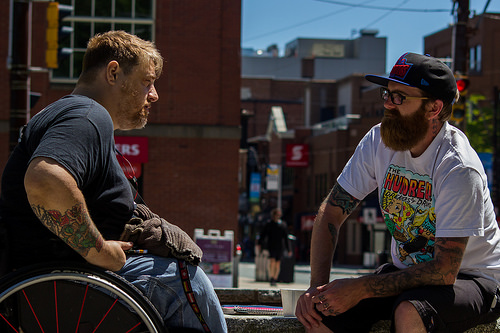Where Empowerment Begins
James Whitford, Executive Director Watered Gardens Gospel Rescue Mission – Published in The Joplin Globe, April 30, 2014
I recall a trip to Grand Rapids where mission and church leaders around the nation gathered to discuss the role of virtue in a free society. During one of the dinners in a conversation about welfare, a gentleman who ran a mission in a large inner city mentioned “Mother’s day”. I could tell the others at the table got it.
I had to ask. He explained many of the welfare-dependent use the term Mother’s Day to signify the monthly date when welfare checks arrive. Why? Because welfare distribution has created a paternalistic viewpoint of government among many of the poor. “Uncle Sam” has become “Dad” or “Husband.” And, in the minds of many, that welfare check is viewed as charity, a gift or even worse, an entitlement. However, if government is by the people, then all it has comes from the people and therefore has nothing of its own to give to the people. So the government cannot be charitable, and welfare, in fact, short-circuits true charity.
I believe Joplin is solidly on a track to solve problems of poverty through true charity. While the government cannot enter into a personal relationship with a poor mother or inspire a young homeless man or give hope to the abused and addicted, you and I can. Face to face charity founded in relationship is the beginning of empowerment. It has been a blessing for me to hear more “empowerment” talk around our community like the use of “hand up” instead of “hand out.” Recently, I even heard someone use the phrase “hand across” to avoid the paternalism one might catch in the use of “hand up.” Although I’m excited to hear more discussion along these lines, proper perception is important. A “hand up” or “hand across” could imply that the poor need help to step up (where we are) or step across (to our side of the tracks.) But if we vacate all pretension and embrace love for our fellow man, we’ll be compelled to step out of our place and into the place of our poor neighbor for this pure and simple reason; to be with him. This is where empowerment begins. True and effective charity is born from a compassion that leads us to develop real relationship with the most broken and destitute even when there appears no hope for change.
I believe Dr. John Perkins would agree. He was born into poverty in Mississippi in 1930 and tragedy followed him through his youth. This nationally recognized author and founder of the Christian Community Development Association (CCDA) teaches that effective charity begins with real relationship and that anything else is bound to be ineffective and costly in the long run. In his book, Beyond Charity, he writes:
“In confronting these conditions, it is much easier to build a new prison or enact a new welfare law or give someone a handout than it is to develop the person. So far, we have settled for the impersonal and the bureaucratic. But, as we are seeing now, in the long run these Band-Aids will be much more expensive than we ever imagined.”
He goes on to discuss one of CCDA’s founding principles, Relocation. He argues that the most effective ministry occurs when love draws us out of our place and into the place of the poor. These are very exciting days in Joplin. We are realizing that instead of waiting in our missions and churches for the poor to come to us, we can fight poverty where it is, embrace the person as he is, and from a new perspective of humility realize a “hand up” or “hand across” may not be what someone needs to join us, but just what we need to join him.



